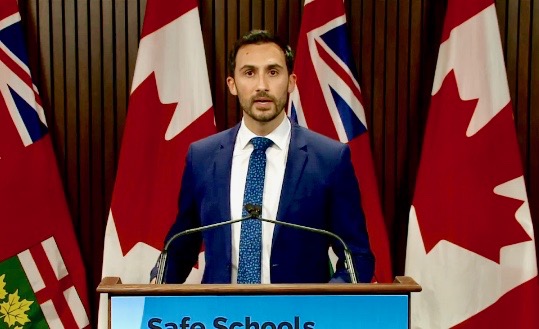ONTARIO – Cell phones, social media and vaping are distracting students across the province.
That’s according to the Government of Ontario, which announced it will be “cracking down on cell phone use and banning vaping in schools.”
During an April 28 press conference, education minister Stephen Lecce introduced a province-wide policy meant to minimize classroom distractions.
The new rules, which come into effect in September, include:
- students in kindergarten through Grade 6 must keep phones on silent and out of sight throughout the school day, unless given explicit permission otherwise;
- students in Grades 7 through 12 will not be allowed to use cell phones during class without their teacher’s permission; and
- students found using or carrying vapes, cigarettes or other nicotine, tobacco or cannabis products will have them confiscated and parents will be notified immediately.
The provincial policy will also ban social media websites from all school networks and devices. According to the province’s press release, it is the first ban of its type in the country.
And as of the 2024-25 school year, report cards will include comments about students’ level of distraction in the classroom.
“Every parent and teacher we speak to has shared the growing problem of cell phone distractions in class, during instructional time, in addition to the disturbing rise of vaping in schools,” stated Lecce.
But local principals from the Upper Grand and Wellington Catholic district school boards told the Advertiser in February they felt sufficiently supported by cell phone policies already in place.
Local schools
The new rules don’t differ greatly from how local schools already operate.
Principals from both boards said students are allowed to bring cell phones to school, as long as the phones don’t disrupt learning.
Rules differ at individual schools across the two boards, but generally students in local elementary schools must keep phones inside backpacks or lockers throughout the day.
And at high schools, cell phone use is limited to outside of class, or when teachers permit it during class.
Both boards also have policies prohibiting students from bringing vapes, cigarettes and other tobacco or cannabis products to school.
In an emailed statement in response to Sunday’s announcement, Upper Grand education director Peter Sovran stated, “We embrace the renewed call to reduce distractions in our classrooms.”
He said students and staff should be provided with devices and supervised digital environments, to give students “equitable access to the tools needed for learning, under the guidance of skilled adults, rather than being distracted by the content on personal devices.”
Wellington Catholic spokesperson Ali Lupal said “We will be working with school administration and stakeholders to review and update current policies and procedures to align with the new provincial policies.”
Provincial spending, supports
“Our government is introducing the toughest policy in Canada to tackle this issue by cracking down on cell phone usage during class time, as well as banning vaping in all schools,” Lecce said.
He noted the new policy differs from a 2019 provincial ban on cell phones.
Back then, he explained, boards were left to create their own policies, whereas the province’s new policy includes a detailed list of province-wide requirements.
This “cracking down” on distractions will include mandatory training for teachers, as well as new supports for students and parents.
“We are talking about behavioural and addiction issues in many cases,” Lecce said.
“We need to approach these issues with compassion and a commitment to help students seek treatment, for those that may need it.”
The province is set to spend $17.5 million during the 2024-25 school year “to support mental health and well being,” he said, including:
- $15 million to support students at risk of addictive behaviours;
- $1 million to educate parents and students about adverse effects of vaping and excessive cell phone use; and
- $1.5 million for parent involvement committees and students to run local prevention campaigns to deter vaping and cell phone distractions.
Ontario will also fork out $30 million over three years to install vape detectors in school washrooms and other spaces, as well as other security upgrades in schools.
The policy’s primary focus, Lecce said, is “prevention through education, to change the hearts and minds of our kids.
“At its core, this is an educational overhaul for the student, the teacher and even the parent.”
There will also be curriculum changes to teach students about the potential dangers of cell phone use and vaping.
“We need to change the culture in schools, and I believe this policy will do that,” said Lecce.
York Region District School Board student trustee elect Hayden Lai said, “As a student, I see every day the distractions created by cell phones in the classroom. We are using our phones all the time – in class, lunch, breaks and after school.
“I also see vaping being very prevalent in our schools and in our washrooms. It is becoming a very common occurrence.
Lai said he is pleased the government is “going to work with us, and educators, on taking the very necessary steps to ensure that students can focus on learning when in class.”
Representatives from the Heart and Stroke Foundation of Canada and the Centre for Addiction and Mental Heath Nicotine Dependence Clinic attended the press conference and spoke in support of the policy.
Lecce said parents across Ontario would receive a letter on April 29 outlining the changes, and signage will be installed in all schools stating the new provincial rules regarding cell phones and vaping.




